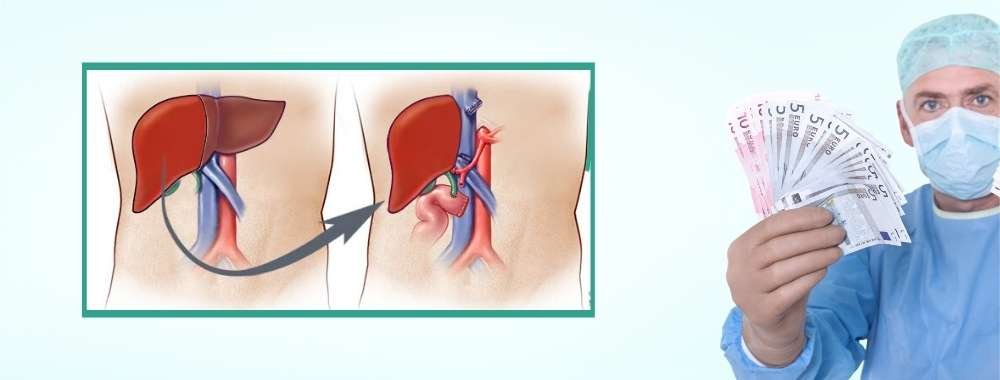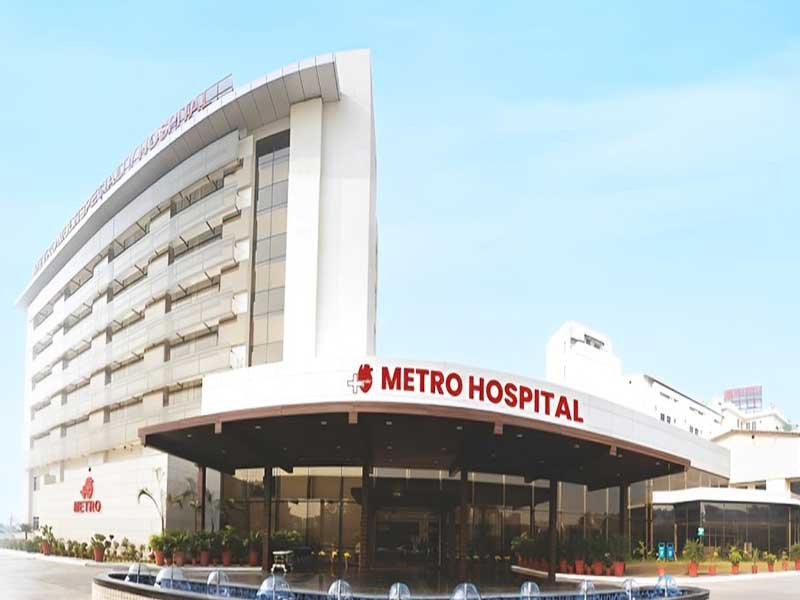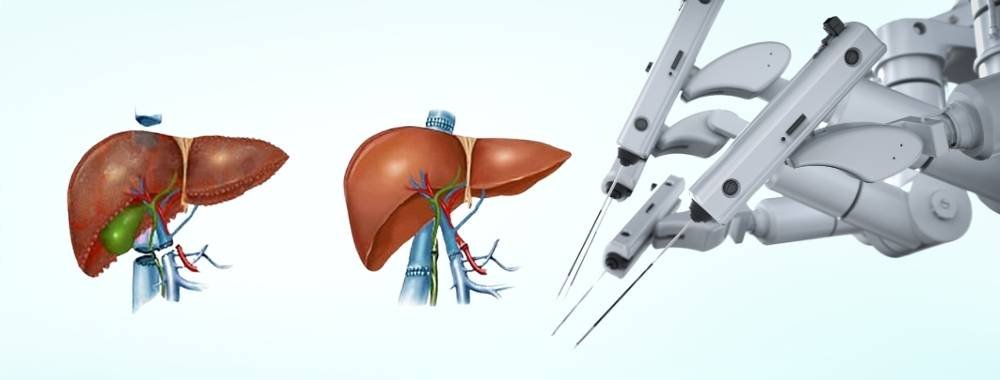Liver transplant in India is the right choice for international patients because of its quality care at affordable cost.
Recovery Time
6 Weeks
Success Rate
95%
Hospital Stay
21 Days
Treatment Type
Surgical
Home Treatments Organ Transplant Liver Transplant
Are you wondering about the cost of liver transplant surgery in India?
India offers liver transplant surgery at a fraction of the cost while maintaining a high standard of medical care, thanks to experienced surgeons and advanced facilities.
With state-of-the-art technologies, India has become a global destination for patients seeking treatment from around the world.
Choose India for top-quality care that fits your budget and ensures the best possible outcome in organ transplant without compromising on quality.

A liver transplant procedure is performed to treat people with liver cancer or end-stage liver failure, which can not be treated with other treatments.
Liver failure might happen suddenly or over a long time. However, a liver transplant may treat acute liver failure.
Liver transplants cost in India are much more affordable compared to Western countries, which is why many patients from around the world choose India for their medical treatment.
The total Liver transplants cost in India includes several things, such as the surgeon’s fees, hospital stay, tests, facilities, and, if needed, rehabilitation. Check the table below for a breakdown of these costs.
Cost Component | Details | Estimated Cost in USD |
Pre-operative Consultation & Diagnosis | Consultations, X-rays, MRI scans, blood tests | 500 USD |
Surgery Costs | Includes surgeon fees, type of surgery, type of implant, and hospital stay | 23,500-28,000 USD |
Rehabilitation and Follow-up | Physiotherapy sessions, medications, supportive devices, and follow-up visits | variable by procedure |

Also Read: Kidney Transplant cost in India
Fill in your details and we'll get back to you soonGet Free Treatment Quote
Country | Cost Structure |
India | 23,500-28,000 USD |
United States | 200,000-300,000 USD |
Germany | 150,000-200,000 USD |
Turkey | 50,000-70,000 USD |
◾Key Takeaways
✅ Affordable Treatment Costs: India offers a cost-effective solution for patients seeking liver transplant surgery in India with advanced technologies, and quality of care.
✅ Advanced Medical Technology: Indian hospitals are equipped with the latest technologies like minimally invasive approaches and so on, which lead to improved patient outcomes and increase the success rates of liver transplant surgeries.
Liver Transplant cost
Treatment Name
Estimated Cost
Liver Transplant 23500-28000 USD
India is renowned for its quality care and advanced technologies in liver transplant surgery. Here are some key factors that attract patients from around the world:
Indian best liver transplant surgeons are skilled and highly experienced in treating patients and many of them are internationally trained by professionals. Here’s a list of the Best Doctors for Liver Transplant in India who are internationally trained and have decades of experience.
Beds: 539
New Delhi
Beds: 230
New Delhi
Beds: 710
New Delhi
Beds: 650
New Delhi
Beds: 191
New Delhi
Beds: 310
New Delhi
Beds: 330
Gurugram
Beds: 380
New Delhi
Beds: 402
New Delhi
Beds: 1300+
Gurugram
Beds: 675
New Delhi
Beds: 500
New Delhi
Beds: 400+
Faridabad
Beds: 106
New Delhi
Beds: 495
New Delhi

Max Super Speciality Hospital, Saket

Aakash Healthcare Super Speciality Hospital

Indraprastha Apollo Hospital

BLK Max Super Speciality Hospital

Dharamshila Narayana Superspeciality Hospital

Fortis Escorts Heart Institute

Fortis Memorial Research Institute

Manipal Hospital Dwarka

Max Super Speciality Hospital Shalimar Bagh

Medanta - The Medicity Hospital

Sir Ganga Ram Hospital

Venkateshwar Hospital

Metro Heart Institute with Multispecialty

PSRI Hospital

Batra Hospital & Medical Research Center
Indian hospitals are dedicated to providing quality care with the latest technologies and facilities. Most hospitals in India are accredited by JCI and NABH, and many are ranked among the Best Hospitals for Liver Transplant in India.

Liver transplant procedures in India have experienced significant advancements and innovations in recent years, leading to improved patient outcomes and increasing the success rates of liver transplant surgeries.
Innovations such as comprehensive liver transplant programs, minimally invasive techniques, and advanced immunomodulation have all contributed to these better outcomes.
The latest advancements in Liver Transplant Surgery include:
India has established various liver transplant programs that provide a multidisciplinary approach to patient care. These programs bring together a team of highly skilled surgeons, hepatologists, anesthesiologists, radiologists, and other healthcare professionals who collaborate to deliver optimal care throughout the entire transplantation process, from patient evaluation to post-transplant follow-up.
Advanced surgical techniques, such as laparoscopic and robotic-assisted liver transplantation, offer several benefits over traditional open surgeries. These minimally invasive methods help reduce blood loss, shorten hospital stays, promote faster recovery times, and improve patient outcomes.
The use of immunomodulatory medications has advanced with the introduction of newer and safer immunosuppressive drugs in India. These medications play a crucial role in preventing the rejection of transplanted livers, thereby enhancing the success rate of liver transplants.
Necessary Diagnostic Tests
Tests | Description |
Blood Test | These tests are processes to find a suitable donor match for the transplant, assess your priority on the waiting list, and also make sure that your body doesn’t reject the donor's liver. |
Diagnostic Test | This will help recognize your liver and general health, including X-rays, ultrasounds, liver biopsy, heart and lung tests, colonoscopies, and mental health tests. In addition, women undergo pap tests, gynecological exams, and mammograms. |
🟢Do’s Before Surgery
✅ Follow Medical Instructions: Follow your doctor’s guidance on when to stop eating and drinking, as well as which medications you should take before surgery.
✅ Be Honest: Be open about any health issues you are experiencing with your doctor.
✅ Prepare for Surgery Day: Take a shower and ensure you are clean and ready for surgery.
✅ Lose Weight if Necessary: If you are overweight, work on losing some weight before surgery to help improve the outcome.
🔴Don’ts Before Surgery
❌ Avoid Alcohol and Smoking: Do not consume alcohol or smoke before the surgery, as these can interfere with the recovery process.
❌ Do Not Use Lotions or Perfumes: On the day of surgery, avoid applying lotions, perfumes, deodorants, or nail polish.
❌ Do Not Wear Jewelry or Contact Lenses: Remove all jewelry, piercings, and contact lenses before heading to the hospital.
There are other liver illnesses where transplantation is offered, which include:
Individuals with liver illness, such as:
Fill in your details and we'll get back to you soonGet Free Treatment Quote
After liver transplant surgery, the patient typically stays in the hospital for about 21 days, while the donor may need to stay for approximately 8 days. Full recovery for the patient usually takes around 6 weeks, though this timeframe can vary depending on their overall health.
The success rate for liver transplant surgery in India is approximately 95%, which is on par with success rates in many other countries worldwide.

Like other surgical procedures, liver transplant also has some complications, including:
Why Choose Mejocare for Liver Transplant Surgery in India?
✅ Team of Top Liver Transplant Surgeons: We recommend the best doctors with more than 20 years of experience.
✅ JCI/NABH Accredited Hospitals: We have also partnered with hospitals that have State-of-the-art Facilities that are equipped with the latest technologies such as robotics, machine learning, and cutting-edge diagnostic and therapeutic equipment, designed to offer you comprehensive and personalized care.
✅ Other Benefits: We provide, swift and detailed responses, accurate cost estimates, help with obtaining medical visas, accommodation in India, and priority appointment scheduling with the doctors. Moreover, we also facilitate your smooth arrival in India, with airport pickup, drop at the hotel, hospitalization assistance, and much more.
Liver transplant surgery is performed to treat severe liver cancer or liver failure that needs to be treated before it worsens. The patient undergoes several tests to determine the condition, and blood samples are taken to get the perfect match for the transplant. And then the transplant will be done by the surgeons.

Medically Reviewed By
QualificationsMBBS, DTMU University, Georgia.Radiation Oncology Resident at Burdwan Medical College and HospitalDr. Aryan Malhotra is a skilled and caring doctor. He is a Radiation Oncology Resident at Burdwan Medical College and Hospital. He treats people with cancer and works closely with patients during their treatment.He completed his MBBS from David Tvildiani Medical University in Georgia. He has passed the USMLE... Read More
Registration Number: 95565
Qualification: MBBS, MD from DTMU University, Georgia, Radiation Oncology Resident at Burdwan Medical College and Hospital
The average cost of Liver Transplants in India is between 23500-28000 USD.
The success rate of Liver Transplants in India is 95%.
Depending on the patient's recuperation, the typical length of stay in the hospital after a liver transplant is two to three weeks. Following surgery, individuals can recover at home for three to six months, but they must adhere to a strict dietary and lifestyle plan and take their prescribed medications as directed by their physician.
Although recovering from a liver transplant can take a while, the majority of patients eventually resume most of their regular activities and enjoy a high standard of living. Although you can typically start gradually increasing your activities after a few weeks, it can take up to a year to fully recover.
Liver transplants involve surgical risks like bleeding and post-transplant infections. Medications to suppress your immune system might be necessary, and there could be bile duct complications. Additional surgeries may be required, and there's a chance the new liver might not function properly. These are key considerations for liver transplant candidates.
Physical therapy, or PT for short, combines exercise, physical activity, and other therapies like massage to help a person's body heal and strengthen after an injury, sickness, or procedure, as well as to relieve pain. Gross motor abilities, which include motions like rolling over, sitting, crawling, running, and leaping, are also developed and improved. These skills encompass balance, coordination, and range of motion, which refers to the movement of joints where two bones meet.
Although recovering from a liver transplant can take a while, the majority of patients eventually resume most of their regular activities and enjoy a high standard of living. Although you can typically start gradually increasing your activities after a few weeks, it can take up to a year to fully recover.
Yes, it is necessary to have a companion.
Overseas travel is possible only after 6 months.
Yes, you can do your own research and choose your therapist.
You can use Paracetamol regularly to manage mild to moderate pain. Non-steroidal anti-inflammatory drugs (NSAIDs) such as diclofenac or ibuprofen can be used to control moderate pain.
Yes, insurance will cover the cost of a Liver Transplant in India.
To discover the top doctors or hospitals in India, you can visit our website, mejocare on the doctors' page, you can filter and find the finest doctors, while on the hospital page, you can identify the best hospitals. Additionally, you can reach out to us, and we will gladly offer you all the necessary suggestions and information you need.
6-12 hours.
No, there is no waiting list for Liver Transplant in India.
Depending on the patient's recuperation, the typical length of stay in the hospital after a liver transplant is two to three weeks. Following surgery, individuals can recover at home for three to six months, but they must adhere to a strict dietary and lifestyle plan and take their prescribed medications as directed by their physician.
After surgery, your healthcare team may perform various tests to ensure your recovery is progressing well. These tests include checking your blood count (CBC), examining your urine, and conducting a chest X-ray to monitor your lungs. An electrocardiogram (ECG) assesses your heart's function, while liver function tests gauge your liver's health. These tests help track your overall recovery and address any concerns that may arise.
Although you won't be totally unconscious, you'll probably forget the process because you'll be sleeping through it. Propofol is a medicine that is not an opioid but is frequently used for profound sedation. It is safe for the majority of patients, acts rapidly, and wears off swiftly.
Around 3 months.
After surgery, constipation is a common side effect of medications, particularly opioids. Certain foods can either help manage or worsen constipation. Avoid high-fat cheese, processed foods high in sugar and fat, saturated fat-rich red meats like beef, dried foods, and full-fat dairy products. It's also wise to steer clear of sugary treats like candies and pastries to alleviate post-surgery constipation.
After surgery, monitoring vitals, caring for wounds, managing complications, rehabilitation, and follow-ups are key aspects of your recovery process.
Our care team can help you.
